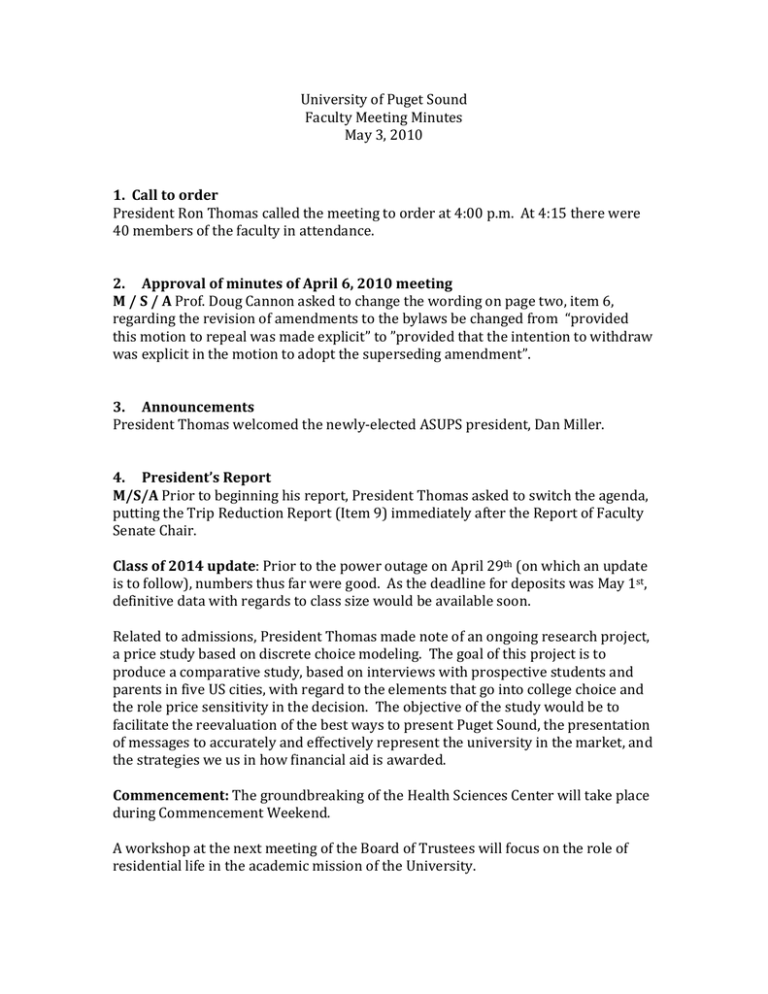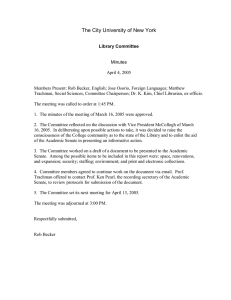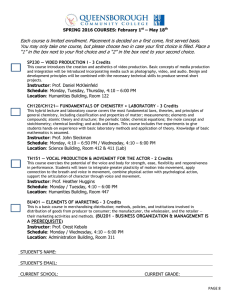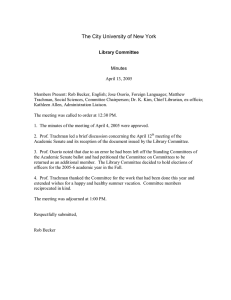University of Puget Sound Faculty Meeting Minutes May 3, 2010
advertisement

University of Puget Sound Faculty Meeting Minutes May 3, 2010 1. Call to order President Ron Thomas called the meeting to order at 4:00 p.m. At 4:15 there were 40 members of the faculty in attendance. 2. Approval of minutes of April 6, 2010 meeting M / S / A Prof. Doug Cannon asked to change the wording on page two, item 6, regarding the revision of amendments to the bylaws be changed from “provided this motion to repeal was made explicit” to ”provided that the intention to withdraw was explicit in the motion to adopt the superseding amendment”. 3. Announcements President Thomas welcomed the newly-elected ASUPS president, Dan Miller. 4. President’s Report M/S/A Prior to beginning his report, President Thomas asked to switch the agenda, putting the Trip Reduction Report (Item 9) immediately after the Report of Faculty Senate Chair. Class of 2014 update: Prior to the power outage on April 29th (on which an update is to follow), numbers thus far were good. As the deadline for deposits was May 1st, definitive data with regards to class size would be available soon. Related to admissions, President Thomas made note of an ongoing research project, a price study based on discrete choice modeling. The goal of this project is to produce a comparative study, based on interviews with prospective students and parents in five US cities, with regard to the elements that go into college choice and the role price sensitivity in the decision. The objective of the study would be to facilitate the reevaluation of the best ways to present Puget Sound, the presentation of messages to accurately and effectively represent the university in the market, and the strategies we us in how financial aid is awarded. Commencement: The groundbreaking of the Health Sciences Center will take place during Commencement Weekend. A workshop at the next meeting of the Board of Trustees will focus on the role of residential life in the academic mission of the University. 5. Academic Vice-President’s Report Dean Kris Bartanen thanked administration and staff for their flexibility and cooperation in response to the April 29 power outage. She noted that Associate Dean Alyce DeMarais was collecting information about what occurred in Thompson hall and that a full report was forthcoming. Dean Bartanen encouraged faculty members to participate in the events of Commencement Weekend. She noted that contracts for fulltime faculty members would be mailed Friday, May 7. Additionally, she announced that a link to a web-based form about faculty scholarship would soon be activated, in order to publicize scholarly activity. There was still room in the Information Literacy Workshop and those interested could contact Library Director Jane Carlin. 6. Report of Faculty Senate Chair Prof. Cannon first asked senate secretary Prof. Richard Anderson-Connolly to announce the results of the recent Faculty Senate elections: Faculty Senate The following three faculty members were elected to serve on the Faculty Senate for three-year terms beginning in 2010-2011: Elise Richman (Art) Ross Singleton (Economics) Amy Spivey (Physics). Chair of the Faculty Senate Steven Neshyba (Chemistry) was elected the Chair of the Faculty Senate for a twoyear term beginning in 2010-2011. Faculty Salary Committee The following faculty members were elected to serve on the Faculty Salary Committee: Lynda Livingston (Business) Jim McCullough (Business). Prof. Anderson-Connolly noted that Prof. Neshyba’s election to chair opened an additional seat, which will be filled with a selection by the new Senate, in accordance with the Bylaws provision for temporary Senators. Barring a few minor glitches, the elections implemented a new software package with great success. Moreover, noted Prof. Anderson-Connolly, the procedures and guidelines of the Senate were updated to reflect the use of the new software. Prof. Cannon thanked Prof. Anderson-Connolly for his work on the election, as well as student Dan Miller for helping oversee the process. Additionally, Prof. Cannon welcomed Prof. Neshyba as incoming chair, noting his past experience as vice-chair and other leadership roles in faculty governance. Prof. Cannon announced that he had submitted a full report to the Board of Trustees, which would to be attached to the minutes of the next meeting of the Senate. He called attention to three aspects of this report: 1) the continued work of the Senate’s ad hoc committee on benefits; 2) the request to include former Faculty Advancement Committee members on a list, which those undergoing the review process could consult; 3) the Senate’s sponsoring of an ad hoc committee on child care. President Thomas thanked Prof. Cannon for his service and those present responded with applause. 7. Trip Reduction Report (Todd Badham and Nicole Mulhausen) Todd Badham, Director of Security Services, and Nicole Mulhausen, Schneebeck Concert Hall Manager, gave a brief presentation on the efforts of the University to meet with the goals established by Washington State to improve employee commuting patterns. As coordinators of this project for the Sustainability Advisory Committee and former co-chairs of the now-disbanded Transportation Task Force, they offered a general history and signaled the difficulties of complying with the Commute Trip Reduction (CTR) Act of 1991. In short, they noted a minor decrease in commuting since we began tracking activity via a survey in 2007. Ms. Mulhausen noted that the survey only asked about one specific week during the year, not commuting habits, which may skew the results, given the timing of the survey (typically around final exams). Additionally, she noted that there are several barriers to further reductions, namely a lack of publicity, a lack of staffing, and funding shortages. At the same time, she signaled the President’s Climate Commitment, a DOT grant given through the city of Tacoma, the ongoing discussions with the Benefits Task Force, and the upcoming Bike Swap as signs of improvement. It was emphasized that the CTR Act stipulates a good faith effort, but that a penalty for not meeting the stated targets was unlikely. 8. Amendment to the Bylaws on the Library, Media, and Information Systems Committee—discussion and potential vote (Doug Cannon) [see attached] M/S/P Prof. Cannon made a motion to revise Section V.6.G of the bylaws, noting that this was a second reading and it was perhaps time to adopt a revision already endorsed by the Senate. The revision, he emphasized, was motivated by a reorganization of Technology Services. Discussion: Prof. William Beardsley speculated if there was a way to change the language such that subsequent minor restructuring of the LMI Committee could be made without amending the bylaws each time. 9. Follow-up to conversation regarding faculty course load (Mott Greene) M/S/A Prof. Greene moved postponing item 9 and moving forward with the discussion on the changes to Pass/Fail Policy. 10. Consideration of Changes to Pass/Fail Policy (Richard Anderson-Connolly) [see attached] Prof. Anderson-Connolly presented three motions regarding changes to the University’s Pass/Fail Policy: 1. Motion: Students must obtain permission of instructor in order to enroll a course for a pass/fail grade. 2. Motion: The policy approved by the ASC on 4 November 2009 prohibiting pass/fail grading in the department of major or minor is hereby repealed. (The ASC motion: No P/F courses in the department of major or minor.) 3. Motion: The policy approved by the ASC on 4 November 2009 limiting pass/fail grading to juniors and seniors is hereby repealed. (The ASC motion: The P/F grade option is only available to juniors or seniors.) M/S To require students to obtain the permission of instructor in order to enroll a course for a pass/fail grade. Discussion: Prof. Nick Kontogeorgopoulos spoke in favor of the motion, noting that several of his courses are adversely affected by the high number of p/f students, many of whom openly disclose their grading status to the instructor. This fact would suggest that the fear of students being evaluated in an unequal way is unfounded. Other faculty supported this notion that the current policy was often supported by “cynical” or “negative” assertions regarding treatment and perception of pass/fail students. Prof. Cannon wondered what the criteria for giving permission would be and stated that the motion was at odds with a system that sought to facilitate student access to different subjects. He also noted that other issues of grading policy do not require instructor permission. Prof. Seth Weinberger later commented that similar ideas had been mentioned during the meetings of the Academic Standards Committee. Several faculty voiced concern that a large number of p/f students could have a negative effect on the dynamics of a class. Prof. Suzanne Holland cautioned that instructor permission might be too sweeping, but transparency was a key issue. Dean Bartanen asked Registrar Brad Tomhave if professors could cap the number of p/f students. Though this was in theory possible, Registrar Tomhave stated, in response to another question, that individual instructors now do not have the option of eliminating p/f in their courses. Instructor Steve Rogers invited ASUPS presidents Dan Miller to represent the student perspective, and Dan defended at length the standing policy. Prof. Keith Ward noted that the discussion up until this point had centered on ”marginal” students and reminded his colleagues that p/f also encouraged students to take intellectual risks. At this point in the discussion, it became apparent that three discrete issues were emerging and Prof. Bill Haltom proposed taking a straw poll for the purpose of gathering information. The results were as follows: In favor / opposed to 1) a cap via the Registrar (21/6) 2) Instructor Permission (8/22) 3) Instructor Knowledge of P/F status of students (22/10) M/S/F A motion was made to call the previous question. M/S A motion was made to remove the anonymity of p/f. M/S/F A motion was made to extend the meeting. Prof. Haltom suggested that the faculty adjourn and called for the delay and, thus, the continuation of the ongoing discussion to be entered into the minutes of the meeting. Prof. Cannon reminded the faculty that in the subsequent meeting a motion could then be made to reconsider the motion. The meeting was adjourned at 5:30 pm. Minutes submitted by Brendan Lanctot, Assistant Professor of Hispanic Studies Faculty Bylaws (Revised Edition July 2009) Proposed revisions to Article V, Sec. 6: G. The Library, Media, and Information Systems Committee. a. The Committee shall consist of the Dean of the University (ex-officio), the Director of the Library (exofficio), the Chief Technology Officer (ex-officio), the Director of Educational Technology, no fewer than five appointed members of the Faculty, and one student. b. The duties of the Committee shall be: 1. To develop general policies, procedures and plans in collaboration with the Library Director and the Chief Technology Officer. 2. To provide recommendations and advice to all parts of the University community on the role of the library, media and information systems in support of the academic program. 3. To review periodically the mission and objectives of the library and information systems and to recommend such changes as are needed. 4. To review periodically the collection development plan for the library to ensure that a balanced collection is maintained for effective support of the academic program. 5. Such other duties as may be assigned to it by the Faculty Senate. Deleted: , Deleted: Associate Vice President for Information Systems Deleted: Associate Vice President for Information Systems Proposal from Curriculum Committee to change allowable Activity Courses credit from 1.5 to 2. Current Language: Graduation Requirements Earn a minimum of 32 units. The 32 units may include up to 4 academic courses graded pass/fail, up to 1.5 units in activity courses, and up to four units of independent study. (See regulations regarding transfer credit and activity credit) Proposed Language: Graduation Requirements Earn a minimum of 32 units. The 32 units may include up to 4 academic courses graded pass/fail, up to 2 units in activity courses, and up to four units of independent study. (See regulations regarding transfer credit and activity credit) This change would be reflected in all relevant documents regarding Activity Course Credits and Graduation Requirements. History and Rationale • The first rationale for this proposal comes from the historical changes in credits at Puget Sound. When the faculty made the decision to reduce the graduation requirement from 36 units (inclusive of “J” term) to 32 units activity credits were also reduced. The 36-unit program of study allowed for 2 activity credits. An equivalent reduction (36 to 32) resulted in a reduction from 2 units to 1.78 units rounded down to 1.5. • Several programs of study rely on activity credits as curricular development in the liberal arts tradition. Notably, the music program where students rely on activity credits, even when not receiving credit, as necessary elements of both their program of study and their preparation for graduate school. • Theatre, Music, IPE, ENG, COMM, BIOL, LC & PSYCH, PE, and CES offer activity units to roughly 1100 enrollment slots a term. • Increasing the allowed number of activity credits may result in the broadening of many students’ liberal arts experiences as they seek out full and partial activity credit from academic programs. Students seeking “lab” like experiences in non-major departments may fulfill those experiences with activity credits. • This increase of activity credits is consistent with Northwest peer and aspiring peer institutions. The graduate requirement for Reed College, for example, is 30-units (each course is 1-unit) plus six quarters of physical education. Whitman requires 124 credits for graduation (equivalent to 31 Puget Sound units). Of those 124 credits, 16 may be activity credits (equivalent to 4 total units at Puget Sound), but no more than 8 of those credits may from “sports studies, recreational, or athletic” courses and no more than 12 may be from academic course (Theatre, Music, Dance, and Rhetoric and Film). Lewis & Clark College has a 128-unit degree requirement (equivalent to 32 Puget Sound units) with required 2 credits from physical exercise, an allowable 4 credits (1 Puget Sound unit) from PE and athletics, and allowable additional academic activity units of at least 4 semester credits. Willamette University allows 2 units of activity credit for a 31-unit degree requirement. • A change in the activity credit policy may diminish artificial demand in Independent Study Units and Learning Center course enrollment. • The faculty may wish to consider the potential impact of a potential .5 academic unit reduction per student on FTEs.




